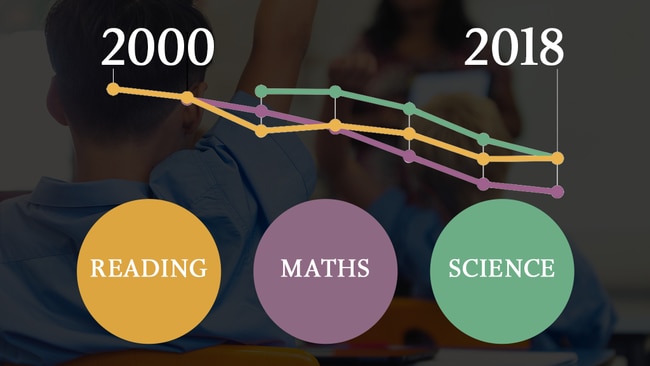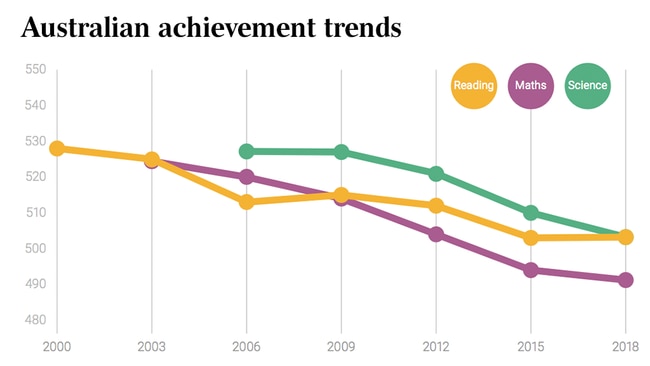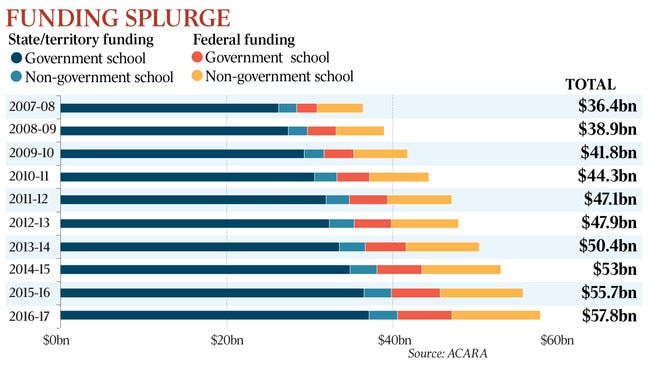PISA global educational rankings: Schools fail on maths, science
Australian teens are performing at a record low standard in reading, maths and science despite a $20bn boost in funding.

Australia has plunged in global education rankings, with the nation’s 15-year-olds performing at a significantly lower standard in reading, mathematics and science than a decade ago, despite government funding for schools rising by more than $20bn over that period.
The 2018 PISA results comparing the academic performance of 79 countries, released on Tuesday night, reveal Australia’s long-term declining academic achievement had continued, with average scores now at record lows across all three tested domains.
READ MORE: Post-primary catch-up sees secondary school soar | Evidence key to turning things around, writes Jennifer Buckingham| Aussie kids years behind China peers | Call to divert funding to rural schools | Expel those who fail our youth, writes Fiona Mueller | Rebecca Urban: How did it all go so wrong for Aussie kids?
Australia’s decline in maths has been equated to the loss of more than a year’s worth of schooling since 2003 — the first year in which the subject was the emphasis of PISA testing — pulling the nation back in line with the OECD average for the first time alongside Latvia, Iceland, Portugal, Russia, Italy, New Zealand and the Slovak Republic. Australian students are now more than 3½ years behind their Chinese peers, and three years behind those in Singapore.
Federal Education Minister Dan Tehan labelled the results “disappointing” and worthy of “alarm bells”. In a strongly worded statement, he urged states and territories to put political differences aside and agree to work together in the interests of students.
The PISA results show that the number of secondary students struggling to demonstrate proficiency has increased, while the proportion of high achievers has slumped.
Australia’s poor showing in maths in the major international assessment program is likely to cause considerable concern, adding to pressure on federal, state and territory ministers over the quality and direction of school education.

Australia, once a top-10 nation in maths, dropped from equal 23rd to 29th from 2015 to 2018, falling significantly below Sweden, the UK, the Czech Republic and Austria — countries with which it was previously on par. The only nation to record a more substantial decline in the subject was Finland.
The Chinese provinces of Beijing, Shanghai, Jiangsu and Zhejiang topped the rankings in all three subjects, while the highest-performing OECD countries were Estonia in reading and science and Japan in maths.
A rise in government investment in schools over the past decade and a succession of high-level reviews, including last year’s Gonski report into educational excellence and multiple curriculum reviews, has done nothing to arrest Australia’s decline.
Mr Tehan called on fellow ministers to back the implementation of reforms, including the Gonski review’s learning progressions that would be designed to ensure every student was able to achieve at least a year’s worth of learning for every school year, when the Education Council meets next week.
Click here to see a snapshot of Australia’s achievement
“They also need to back all the reforms that make up the National School Reform Agreement and embed how to teach phonics as part of teacher training,” Mr Tehan said.
“My message to the state and territory education ministers is this: leave the teachers’ union talking points at home and be ambitious.
“We have a clear road map to implement the reforms that will improve student outcomes and we should be bold and decisive.”
Conducted every three years since 2000, the OECD Program for International Student Assessment, or PISA, is an international measurement of 15-year-olds’ applied knowledge in reading, maths and science. Last year 600,000 students in 79 countries took part, including more than 14,000 students from 740 Australian schools, with the assessment taking place between July and September.
The Australian Council for Education Research, which manages the assessment in Australia on behalf of the OECD, warned that policymakers “must take notice of these results”.
ACER deputy chief executive Sue Thomson noted that, for the first time, Australia had failed to perform above average in each of the domains.

She highlighted the fact Australia had been overtaken by nine countries it previously outperformed in maths.
The proportion of high performers in maths has taken a dive, from 20 per cent to 10 per cent over the longer term. In comparison, China has 44 per cent of students deemed high performers, while 91 per cent are deemed proficient, compared with just 54 per cent in Australia. “There is a pattern of improvement in maths performance in comparable countries that just isn’t replicated in Australia,” Dr Thomson said.
Reading and science scores have also taken a hit. In reading, Australia’s average score was stable between 2015 and 2018 but it has declined over the seven testing cycles. Once ranked in the top five, Australia is now in 16th place.
In science, the nation has gone from eighth to equal 15th over the long term.
The results reveal that the non-government school sector outperformed the government sector, while metropolitan students scored higher on average than their regional and remote counterparts. However, average performance has dropped in the long term across all school sectors, socio-economic quartiles and cultural groups assessed.
The ACT was the highest-performing jurisdiction across all domains; however, its scores have declined in the long term. The same applies to NSW, South Australia, Western Australia and Tasmania. In Queensland and Victoria, reading scores were stable, but maths and science fell.
Victorian Education Minister James Merlino called for an immediate review of the national maths curriculum. He said he would also push the Education Council to consider the need for universities to reinstate prerequisite subjects, particularly maths, for certain courses.
“The bottom line is that we have too many out-of-field teachers in the maths area,” Mr Merlino said.
Australian Catholic University senior research fellow Kevin Donnelly, who co-chaired a review of the national curriculum in 2014, said education departments across all levels of government should be held to account for “wasting billions of dollars” and overwhelming teachers with “useless, sterile and ineffective fads”.



To join the conversation, please log in. Don't have an account? Register
Join the conversation, you are commenting as Logout